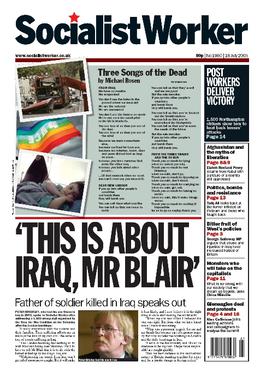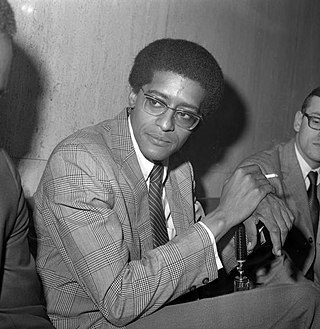
The 1967 Detroit riot, also known as the 12th Street Riot, and the Detroit Uprising, was the bloodiest of the urban riots in the United States during the "long, hot summer of 1967". Composed mainly of confrontations between black residents and the Detroit Police Department, it began in the early morning hours of Sunday July 23, 1967, in Detroit, Michigan.

The United Auto Workers (UAW), fully named International Union, United Automobile, Aerospace and Agricultural Implement Workers of America, is an American labor union that represents workers in the United States and southern Ontario, Canada. It was founded as part of the Congress of Industrial Organizations (CIO) in the 1930s and grew rapidly from 1936 to the 1950s. The union played a major role in the liberal wing of the Democratic Party under the leadership of Walter Reuther. It was known for gaining high wages and pensions for automotive manufacturing workers, but it was unable to unionize auto plants built by foreign-based car makers in the South after the 1970s, and it went into a steady decline in membership; reasons for this included increased automation, decreased use of labor, mismanagement, movements of manufacturing, and increased globalization. After a successful strike at the Big Three in 2023, the union organized its first foreign plant (VW) in 2024.
The South End is the official student newspaper of Wayne State University in Detroit, Michigan, published in print and online. It was founded in 1967, and its publication is funded partly from university funds and partly from advertising revenues. It is distributed free of charge.

The Revolutionary Socialist League (RSL) was a Trotskyist group in the United States established in 1973 and disbanded in 1989.
The New Communist movement (NCM) was a diverse left-wing political movement during the 1970s and 1980s in the United States. The NCM were a movement of the New Left that represented a diverse grouping of Marxist–Leninists and Maoists inspired by Cuban, Chinese, and Vietnamese revolutions. This movement emphasized opposition to racism and sexism, solidarity with oppressed peoples of the third-world, and the establishment of socialism by popular revolution. The movement, according to historian and NCM activist Max Elbaum, had an estimated 10,000 cadre members at its peak influence.

The gay liberation movement was a social and political movement of the late 1960s through the mid-1980s in the Western world, that urged lesbians and gay men to engage in radical direct action, and to counter societal shame with gay pride. In the feminist spirit of the personal being political, the most basic form of activism was an emphasis on coming out to family, friends, and colleagues, and living life as an openly lesbian or gay person.
The Dodge Revolutionary Union Movement (DRUM) was an organization of African-American workers formed in May 1968 in the Chrysler Corporation's Dodge Main assembly plant in Detroit, Michigan.
Martin Glaberman was an American Marxist writer on labor, historian, academic, and autoworker.

James Boggs was an American Marxist political activist, auto worker and author. He was married to philosopher activist Grace Lee Boggs for forty years until his death.

The League of Revolutionary Struggle (Marxist–Leninist) was a Marxist–Leninist[1] movement in the United States formed in 1978 by merging communist organizations. It was dissolved by the organization's leadership in 1990.
The League of Revolutionary Black Workers (LRBW) formed in 1969 in Detroit, Michigan. The League united a number of different Revolutionary Union Movements (RUMs) that were growing rapidly across the auto industry and other industrial sectors—industries in which Black workers were concentrated in Detroit in the late 1960s and early 1970s. The formation of the League was an attempt to form a more cohesive political organ guided by the principles of Black liberation and Marxism-Leninism in order to gain political power and articulate the specific concerns of Black workers through political action. While the League was only active for a short period of time, it was a significant development in a time of increasing militancy and political action by Black workers and in the context of both the Black liberation and Marxist-Leninist movements in the United States.
The International Marxist Group (IMG) was a Trotskyist group in Britain between 1968 and 1982. It was the British Section of the Fourth International. It had around 1,000 members and supporters in the late 1970s. In 1980, it had 682 members; by 1982, when it changed its name to the Socialist League, membership had fallen to 534.
Jews have been living in Metro Detroit since it was first founded, and have been prominent in all parts of life in the city. The city has a rich Jewish history, but the Jewish community has also seen tensions and faced anti-Jewish backlash. Today, the Jewish community is quite established and has a number of community organizations and institutions, based nearly completely outside Detroit city limits.

James Patrick Cannon was an American Trotskyist and a leader of the Socialist Workers Party.

The Workers World Party (WWP) is a Marxist–Leninist communist party in the United States founded in 1959 by a group led by Sam Marcy. WWP members are sometimes called Marcyites. Marcy and his followers split from the Socialist Workers Party (SWP) in 1958 over a series of long-standing differences, among them their support for Henry A. Wallace's Progressive Party in 1948, their view of People's Republic of China as a workers' state, and their defense of the 1956 Soviet intervention in Hungary, some of which the SWP opposed.

Socialist Worker is the name of several newspapers currently or formerly associated with the International Socialist Tendency (IST). It is a weekly newspaper published by the Socialist Workers Party (SWP) in the United Kingdom since 1968, and a monthly published by the International Socialists in Canada. It was a monthly published by the International Socialist Organization (ISO) in the United States from 1977 to 2019, and a biweekly published by the Socialist Workers Party in Ireland, a quarterly published by the International Socialist Organisation in Zimbabwe and a monthly published by the former International Socialist Organisation in Australia.
General Gordon Baker Jr. was an American labor organizer and activist.
Revolutionary Action Movement (RAM) was a Marxist–Leninist, black nationalist organisation which was active from 1962 to 1968. They were the first group to apply the philosophy of Maoism to conditions of black people in the United States and informed the revolutionary politics of the Black Power movement. RAM was the only secular political organization which Malcolm X joined prior to 1964. The group's political formation deeply influenced the politics of Huey Newton, Bobby Seale, and many other future influential Black Panther Party founders and members.
Mike Hamlin (1935-2017) was an American labor activist and social worker.

Kenneth Vern "Ken" Cockrel Sr. was an American politician, prominent attorney, and revolutionary, community organizer, from the city of Detroit. Cockrel served as a member of Detroit's Common Council, from his swearing-in in 1978 until 1982. In addition to winning major cases representing poor and working class Detroiters, Cockrel rose to political prominence as he helped organize social and political movements, including the League of Revolutionary Black Workers and other radical black, Marxist formations.








